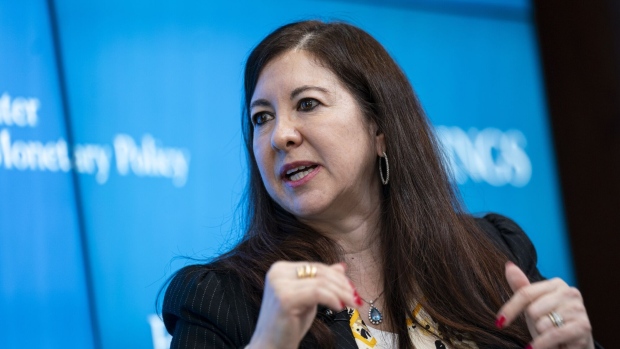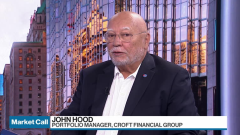Jun 18, 2024
Fed’s Kugler Says Rate Cut Likely Appropriate Later This Year
, Bloomberg News

(Bloomberg) -- Federal Reserve Governor Adriana Kugler said it will likely be appropriate for the central bank to lower interest rates later this year if economic conditions unfold as she anticipates.
While inflation remains too high, Kugler said, recent data have made her cautiously optimistic that the Fed is on track and making headway toward the central bank’s 2% goal.
“I believe economic conditions are moving in the right direction,” Kugler said in prepared remarks for an event in Washington on Tuesday. “If the economy evolves as I am expecting, it will likely become appropriate to begin easing policy sometime later this year.”
Following a pickup in price growth in the first quarter, Kugler said more recent information on economic activity, the job market and inflation point to “renewed progress.” Notably, a key measure of consumer prices stepped down for a second month in May.
She added further progress is likely to be “gradual,” but she remains optimistic improving supply and cooling demand conditions will support a continued easing in inflation.
“I believe the current stance of monetary policy is sufficiently restrictive to help cool the economy and bring inflation back toward 2% without a sharp contraction in economic activity or a significant deterioration of the labor market,” Kugler said.
Fed officials penciled in one rate reduction for this year, according to the median projection in forecasts published last week. Policymakers have emphasized in recent weeks that they are prepared to continue holding borrowing costs at their highest levels in more than two decades until they gain more confidence inflation is abating.
“I certainly don’t discount the risk to the upside on inflation,” Kugler said in a question-and-answer session following her remarks.
She said Fed officials will assess incoming data to guide policy decisions, including on how much to cut interest rates.
Kugler also weighed in on recent discussions about the long-run neutral interest rate, known as “r-star,” which describes a policy stance that neither stimulates nor restricts the economy. She said that while the concept is important to try and understand, officials are more concerned with the degree to which their policy is restrictive in the short term.
“The long-term natural rate of interest is not actually very helpful,” Kugler said. “It’s not what we think of when we’re making policy.”
--With assistance from Molly Smith.
(Adds remarks at end of story from question-and-answer session)
©2024 Bloomberg L.P.






